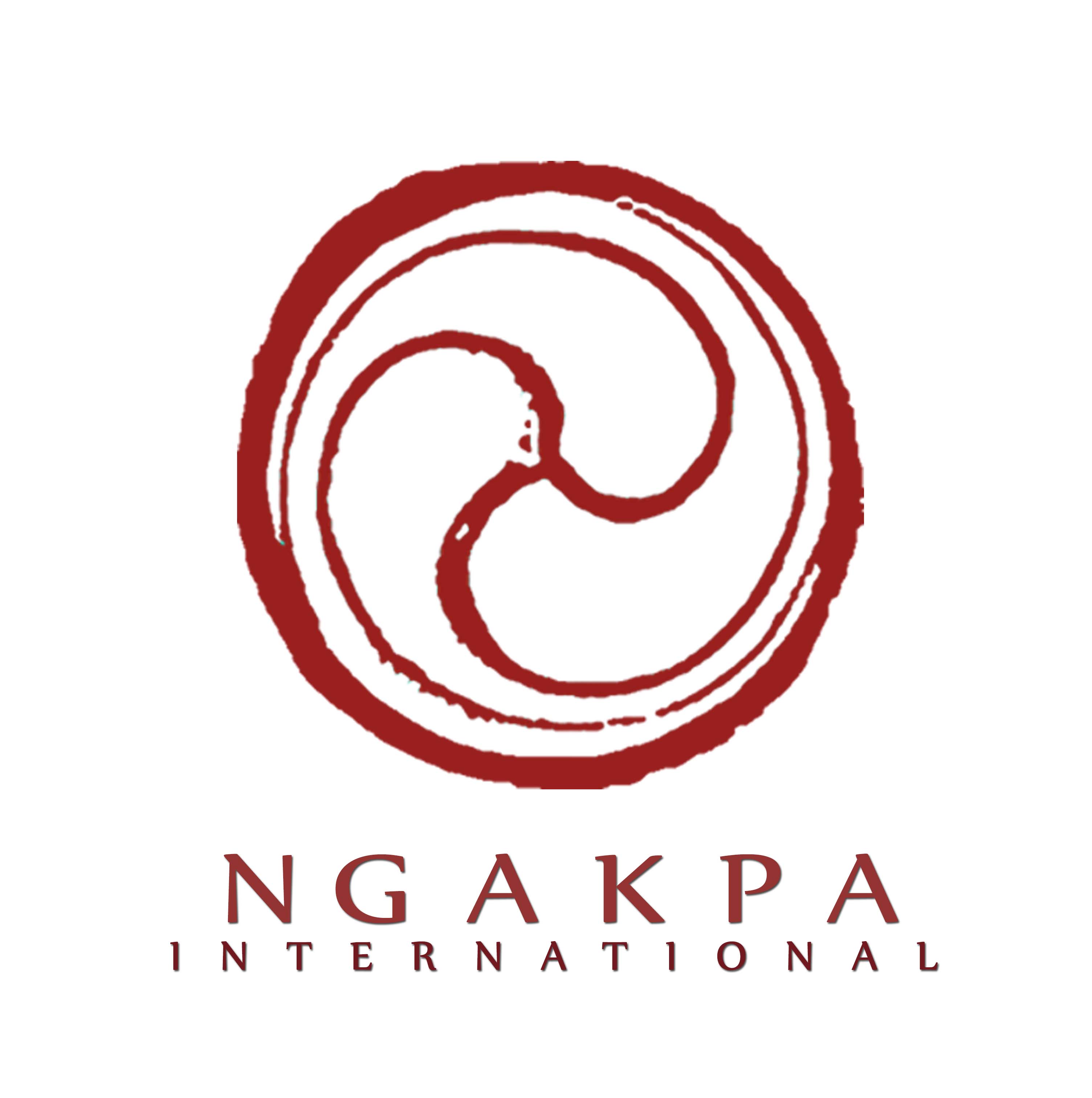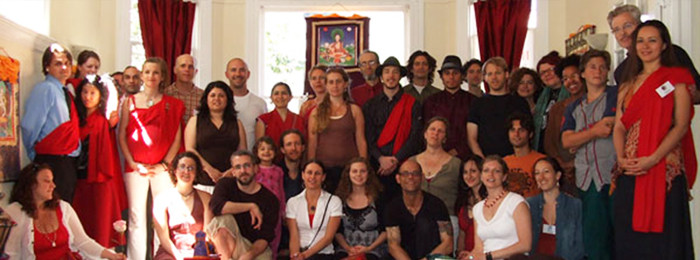Group Leader Training
Group Leader Training
The Group Leader Training Program serves the need for training leaders who will serve their local communities, to connect them with the tools for meditation practices and for studying fundamental Buddhist views.
Of course Buddhism is vast. It offers immense resources of contemplation, art, narrative, poetry, ritual, medicine and more. In its traditional setting training of Tibetan Buddhist teachers is extensive and may take over thirteen years of full time education or more. This thirteen years is in addition to being raised in Buddhist culture and steeped in Buddhist ritual since birth through exposure to family and society. As a result there are many extraordinary Lamas who offer empowerments, rituals and training in their respective lineage. This activity is crucial for the continuation of Tibetan Buddhism. While such intensive training under the direction of Lamas is paramount (and this is what is offered for the Vajra Sangha, Pema Khandro’s personal students) there is also a need for other types of support, especially at the introductory and local levels and covering the essential topics for exploring the Nyingma tradition – see our Curriculum here.
There is a need for local and ongoing support by Group Leaders – for connecting their communities with Buddhism on a more foundational level. The absence of major centers of Buddhist learning in North America, and the existence of so few accessible temples and communities places a greater responsibility on local practitioners to organize groups for practice and fostering community connections. In particular – there are few places to practice in the Tibetan Yogi tradition, in which spiritual life is cultivated by work and family.
Because Buddhism is new to the West, and there is great interest in meditation and Buddhist views, local practice communities must provide a gateway and support for those who wish to get to know Buddhism. This is a hallmark of the Buddhist Yogis (ngakpa) tradition, to provide education and support not only for serious practitioners but also for lay people – the general public.
Because our mission as Tibetan Buddhist Yogis is to embody and share Buddhism integrated with family and work life – public classes and local gatherings are an important resource that can be offered to the public. To fill the need which is there and to fulfill our mission of “Buddhist Wisdom for Everyone,” cultivating group leaders is necessary. Through leadership on the part of individual practitioners, Buddhist foundations can be studied and practiced in local communities, led by community leaders who are seriously engaged in the tradition themselves.
Thus, community leadership by Group Leaders can provide opportunities for encountering Buddhism on a regular basis, getting familiar with practices and principles and getting support to do practices.
Group leaders are needed to lead meditation practices, lead discussion and study groups that focus on Buddhist fundamentals.
Such group leaders will require
- a firm grounding in the methods of daily meditation practice
- a clear curriculum for studying foundational Buddhist perspectives
- and ongoing mentorship with Pema Khandro
Therefore this training sets out
- an authorized curriculum which covers the key meditations for regular practice
- as well as three sets of extended discussion group formats.
With such a clear curriculum, the possibility is open for serious practitioners to act as leaders without overstepping the bounds of authorization in a tradition that requires more than a decade and a half of training before receiving carte blanche authorization for teaching. Instead, by offering a specific and limited curriculum, a reachable goal for study, training and leadership can be provided to Group Leaders.
The training offered will be focused on Group Leaders
- who understand Buddhist practice
- who embody Buddhist ethics
- who can support practice and study in their local communities
- and maintain continuous education
Before coming to the training, participants must already have demonstrated extensive commitment and engaged in extensive practice and study (See pre-requisites below). Because of these pre-requisites it is possible to offer a condensed training in an accessible format that combines in person retreats and online learning.
Therefore, Ngakpa International is offering the next iteration of its Meditation Instructor program for practitioners who have the potential to develop leadership skills in Group Leader Training.
The training is drawn from Tibetan Buddhism’s Nyingma lineage, covering a curriculum of topics categorized as ‘sutra’ as well as five key methods of our primary meditation series, known as calm abiding practice (Tib. Zhine, Skt. Shamatha) which are covered in the Meditation Instructor Training. Group Leaders will also lead Tsok and give the lung – or oral transmission for all the practices necessary for year one and two students in the Presence as the Path curriculum.
These ‘sutra’ methods are seen from the perspective of Dzogchen, since this is the orientation of our own lineage and Pema Khandro’s teachings. Though, of course, this course *does not provide any authorization for Group Leaders to teach Dzogchen* since such an endeavor would require far more extensive training, experience, transmission and so forth.
Overview
The emphasis of this program will be daily practice and leading groups in discussion and study of two texts and a set of articles. It will train Group Leaders to:
1. Lead meditation classes for finding abiding calm
2. Lead Tsok – the Tantric Feast practice
3. Lead beginning two hour classes that introduce fundamental principles
3. Facilitate discussion groups that focus on fundamental principles as set out in two authorized texts and articles by Pema Khandro.
4. Develop local community based Buddhist groups (sangha) as peer-support practice communities
5. Teach day long meditation retreats which are focused on meditation practice
6. Give initiation in the Presence as the Path including training others in the daily practice, prayers, tsok, Vajra Guru Mantras, Seven Line Song, Vajrasattva practice and White Tara practice.
Requirements
1. Completion of Group Leader Training. Students must attend all parts of all modules including attending the online teachings live, in person, in order to graduate. (No exceptions)
2. Monthly or Yearly check in and group evaluation with an experienced Dharma Leader.
3. Maintain regular contact with mentoring teachers and program peers.
4. Monthly check in with dharma buddy (a peer who is also in the program).
5. Completion of practicum – Leading six one day meditation retreats.
6. Tuition and dana paid for entire course of the Group Leader Training.
7. Daily practice throughout the duration of the course.
8. Completion of Bodhisattva Training (three modules) and satisfactory maintenance of Bodhisattva vows and Buddhist ethical guidelines of the ten virtues, five vows and fourteen vows.
9. Service as a Teaching Assistant in Vajrayana Training for two years.
10. Membership in Vajra Sangha and completion of Ngakpa Seminary for three years or its equivalent.
11. Completion of Ngondro.
Scope of Authorization
Vajrayana has many roles and levels of leadership, such as: Umdze, (chant leaders); Gekors (masters of discipline, who keep order in the sangha); Vajra masters who can give empowerments and train students (Acharyas, Loppons); Khenpos (PhD equivalent + intensive retreat training + ethical life) who teach Buddhist philosophy and practice; Lamas (authorized Buddhist teachers); Lineage Holders (authorized lineage holders who can transmit the lineage and give empowerments) and Tulkus (who can assume all or any of the roles). Graduates of this training will not be qualified as any of these listed above. Instead they are a new category – which we call “Group Leaders.” This is most closely like the first one mentioned above, the Umdze – the chant leaders – the person who leads group practices. They will not be authorized as Buddhist teachers, but instead as Buddhist practice instructors and leaders. The distinction is important one in order to offer a workable goal for leaders to accomplish in a relatively limited period of time, without overstepping the traditional requirements for study before greater authority can be conveyed.
Additional Prerequisites
- Minimum of three years of meditation practice experience and completion of Meditation Instructor Training.
- Ability to devote time and energy to the program, to attend and complete all course components, to take time away from work and other commitments in order to complete the study, practice and attend group sessions.
- Ability to maintain daily practice over the long term following the curriculum of meditation or Buddhist Tantra accomplishment practice – see our Curriculum here.
- Ability to pay tuition and practice of Dana (teaching offering) in support of all program components (see tuition for details).
- Maintenance of a harmonious relationship with Pema Khandro Rinpoche, Buddhist Yogis Sangha and Ngakpa International.
- CONSISTENCY OF CONDUCT
- Embodying Buddhist principles: generosity, discipline, patience, diligence, compassion, equanimity, respect for teachers and sangha, harmony with teachers and sangha
- Ethical integrity: upholding the five precepts and Commitment to Buddhist ethics – especially maintaining sobriety (in terms of being free from substance addictions) and refraining from sexual misconduct (includes refraining from romantic relationships with students and refraining from breaking vows or causing others to break their vows.) Refraining from hate speech (including hate speech on social media).
- Ethical commitment to refrain from engaging in sexual relationships with any students. If a relationship begins with someone who has been a student it will be only after they have ceased from being a student for at least six months and have already resumed working with another meditation teacher.
- Psychological health and stability, a history of emotional and psychological development, a history of emotional and psychological stability and well-being for the previous five years.
- Continuing psychological and emotional stability and well being throughout the duration of the course and for a previous five year period.
- Wish to lead based on service, gratitude, humility and kindness rather than ego-driven ambition or narcissism. This includes: a conscious awareness of one’s own limitations; understanding the scope of one’s competence and authority; the willingness to draw on support from teachers and other professionals; adopting the practice of referring when students have needs outside one’s scope of competency; attribution of credit to sources/teachers when repeating or using their works.
- Personal and interpersonal maturity: ability to maintain harmonious relationship with teachers and peers, emotional maturity to work through difficulties in practice and interpersonal difficulties, maintaining respect for past teachers and dharma community
- Respect for diversity: Respect towards other religious views, expressing kindness towards all beings regardless of race, ethnicity, gender, religion, sexual orientation or sectarian affiliation; respect for all types of Buddhism.
- Invitation to the training by Pema Khandro Rinpoche upon satisfactory completion of all pre-requisites.
________
More Details
- Our classes vary. Some are study oriented, some practice oriented, some community oriented and some are discussion oriented. We also have classes which are beginner oriented.The tone of these classes are *study oriented
- Next Group Leader Course Begins Oct 2019. Visit our upcoming events for Dates
- The following year’s calendar will be announced each December, or asap.
- Sign up for our newsletter to receive an email when the calendar is announced.

